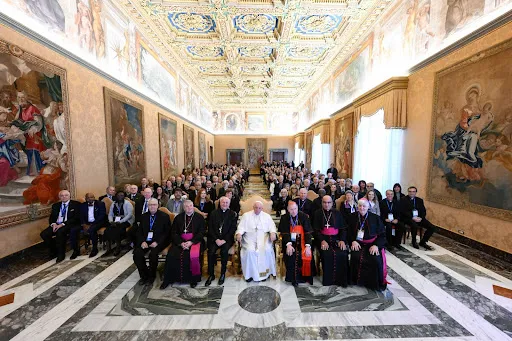
Pope Francis told the Pontifical Academy for Life on Monday that it faces an enormous task in evaluating the ethics of emerging technologies, such as artificial intelligence (AI) and human enhancement.
The pope asked the academy on Feb. 20 to “ensure that scientific and technological growth is reconciled more and more with a parallel development … in responsibility, values, and conscience.”
The rapid acceleration of new technologies can produce significant consequences for human life and the environment “that are not always clear and predictable,” Francis said.
“It is paradoxical, for example, referring to technologies for enhancing the biological functions of a subject, to speak of an ‘augmented’ man if one forgets that the human body refers back to the integral good of the person and therefore cannot be identified with the biological organism alone. A wrong approach in this field actually ends up not ‘augmenting’ but ‘compressing’ man,” he said.
The Pontifical Academy for Life is meeting in Rome this week for its 28th General Assembly Feb. 20–22.
In addition to the in-person meeting, the academy is hosting a free online webinar on “Emerging Technologies and the Common Good” with speakers scheduled to discuss technological convergence in nanotechnology, biotechnology, and the cognitive sciences.
“Over these days you will reflect on the relationship between the person, emerging technologies, and the common good: It is a delicate frontier, at which progress, ethics, and society meet, and where faith, in its perennial relevance, can make a valuable contribution,” Pope Francis said.
“In this sense, the Church never ceases to encourage the progress of science and technology at the service of the dignity of the person and integral human development.”
In his speech to the academy, Pope Francis also warned that “technology cannot replace human contact.” He said that it is a “bad temptation” to make “the virtual prevail over the real.”
“It is evident that the technological form of human experience is becoming more pervasive every day: in the distinctions between ‘natural’ and ‘artificial,’ ‘biological’ and ‘technological,’ the criteria with which to discern what is human and of technology become increasingly difficult. Therefore, a serious reflection on the very value of man is important,” he said.
During the general assembly, the academy will award the 2023 Guardian of Life Award to Magdalen Awor, a midwife from Uganda who works with the Italy-based nongovernmental organization Doctors with Africa CUAMM to provide medical training in South Sudan.
St. John Paul II founded the Pontifical Academy for Life in February 1994 to study and provide information and training about the principal problems of law and biomedicine pertaining to the promotion and protection of life.
Venerable Jérôme Lejeune, a French pediatrician and geneticist who opposed the use of prenatal testing for the purposes of carrying out elective abortions, was the academy’s first president, though he died from lung cancer just a few weeks after its founding.
Pope Francis changed the statutes for the Pontifical Academy for Life in 2016, dropping the requirement for the academy members to sign a declaration affirming that “from the moment the embryo is formed until death it is the same human being which grows to maturity and dies.”
The new statutes say that its members can be of any religion, though they should “promote and defend the principles regarding the value of life and dignity of the human person, interpreted in a way that conforms to the Magisterium of the Church.”
Last year, a Jesuit-run Catholic journal came under fire from over 50 organizations for an article supporting legalized assisted suicide written by a Pontifical Academy for Life member.
The academy’s official Twitter account also promoted a Vatican-published book synthesizing a 2021 seminar on ethics, in which a participant discussed “the possible legitimacy of contraception in certain cases.”
Archbishop Vincenzo Paglia has been the president of the Pontifical Academy for Life since 2016.
